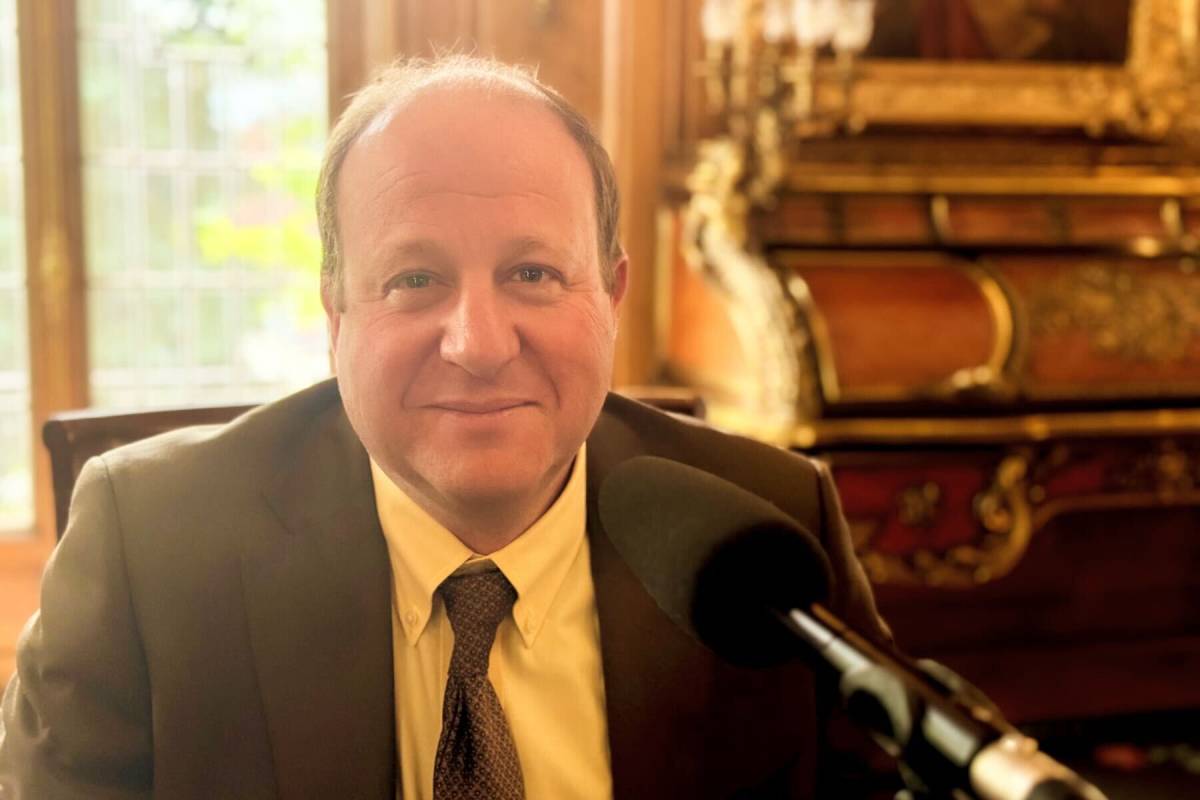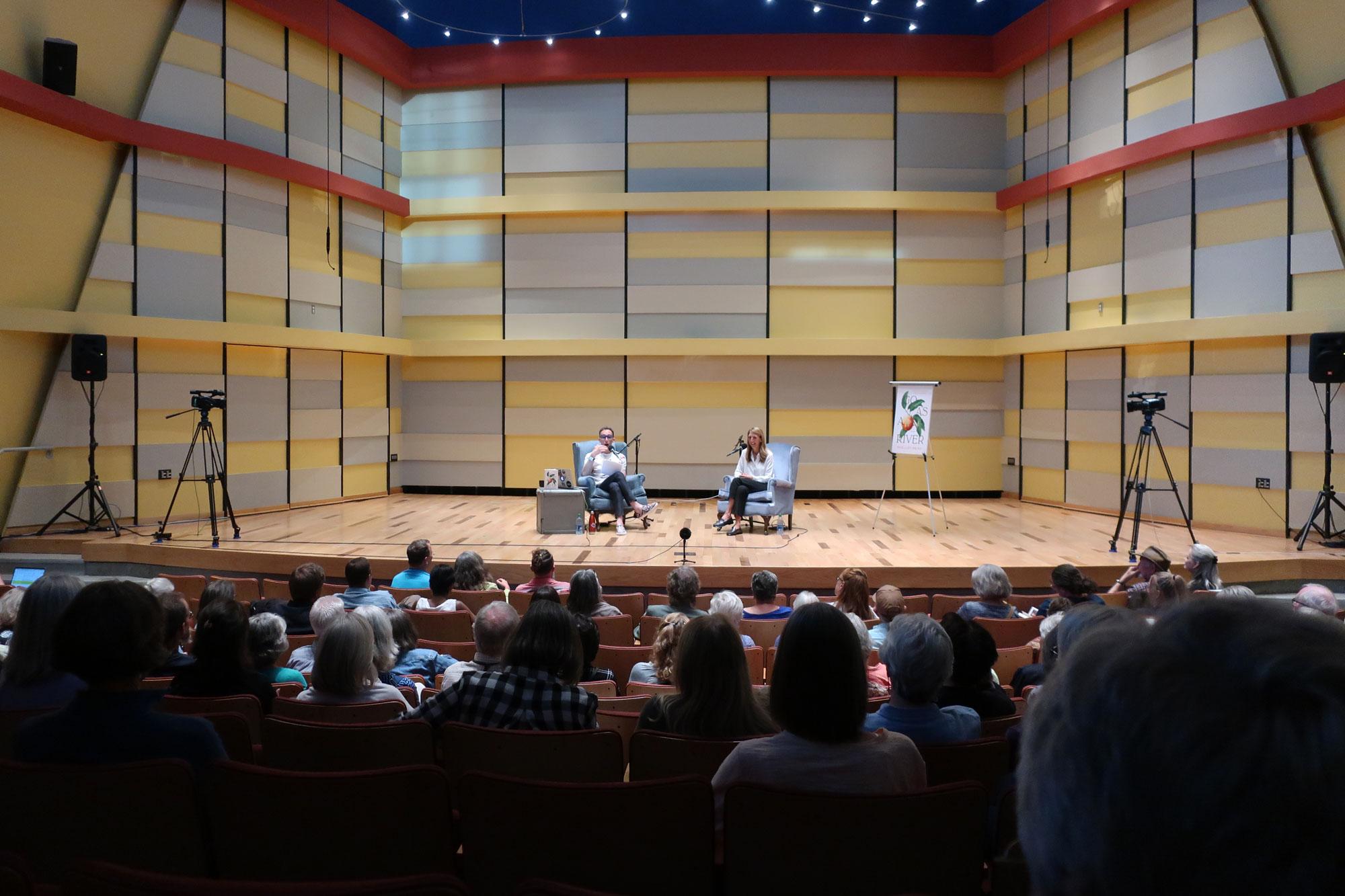
Gov. Jared Polis blasted Congressional Republicans over a bill passed in the early hours of Thursday morning, saying the budget cuts included in the so-called “big, beautiful bill” would kick some Coloradans off their health care and raise costs for the rest.
“If this passes, we’re talking 20 to 30 percent increases in premiums for most Coloradans,” Polis told Colorado Matters senior host Ryan Warner during an interview Thursday afternoon, adding that number was based on “the cost of the uncompensated care for the hundreds of thousands of people who would lose their coverage entirely.”
The federal legislation includes significant tax cuts as well as reductions to Medicaid, food assistance programs and rollbacks on clean-energy tax credits. It still needs to clear the US Senate, but as written could mean a tougher outlook for the state budget, Polis said.
“It would be disastrous, right? Because not only would enormous health care costs be shifted onto the state, who would then be in the unenviable position of having to decide which people to throw off of health care and how much to cut it back. But also with some of the revenue changes that are in there, it would actually reduce revenue to the state,” Polis said.
During a half-hour interview with Colorado Matters, Polis discussed state budget impacts, his line in the sand on state housing policy and the latest step in a project that would overhaul accessibility at the state capitol.
This interview has been edited for length and clarity.
Ryan Warner: You've indeed described the federal budget, at least the House's version, as “cruel.” Why do you use that word?
Polis: Well, the biggest thing that I focus on is the hundreds of thousands of Coloradans that would be thrown off of their health care coverage plan with the Medicaid cuts. In addition to several hundred thousand Coloradans losing their health care, it would raise rates for everybody else because the cost of uncompensated care — that means, when a hospital can't bill anybody for care that they are forced by law to give — would be shifted onto everybody with commercial insurance. So I think if this passes, we're talking 20 to 30 percent increases in premiums for most Coloradans.
Warner: What do you base that number on?
Polis: The cost of the uncompensated care for the hundreds of thousands of people that would lose their coverage entirely.
Warner: Okay. You've done that math then for this state?
Polis: Well, if you want to do the math actuarially, you have to actually see what passes and what comes in. The true answer is, we don't know until we know. That's why it could be 20 percent, it could be 30, it could be 15, but clearly there are a lot of costs there that would be shifted onto everybody who pays for their own insurance. So you won't know until, unfortunately, a year after the bill became law, exactly what that number is, but there are huge costs there.
Warner: Under the House's plan, Colorado would get less Medicaid money, even still, if it continues to insure undocumented children and undocumented Coloradans who are expecting. Are you prepared to kick them off the Medicaid rolls to preserve federal funding if it comes down to it?
Polis: Well, hundreds of thousands of Coloradans are going to lose their Medicaid coverage. Many will be Americans, some might be undocumented, but many people will lose their coverage.
Warner: But to this question specifically, would you kick them off?
Polis: Well, I think the lens that will apply is how could we make sure that the smallest number of people lose coverage? So, again, dollars are fungible. We value health care. We would take whatever actions were needed to protect health care for the highest possible number of Coloradans.
Warner: Do you believe that children who are undocumented and expectant mothers should be on Medicaid?
Polis: Well, expectant mothers, obviously the baby is an American, and we want to make sure that that health care is provided from conception all the way through birth, and the neonatal services are critical for that American child. With regard to children in mixed status, families who lack documentation, we certainly want to make sure that we can meet their health care needs, and we often do that through the community health clinics. If there is no payer, then those costs would be shifted. So we would hope that the federal government will A., secure the border and fix our broken immigration system. But B., if they fail to do that, at least help pay for those who need necessary health services.
Warner: I don't mean to badger you on this. The House is saying if states continue to cover this group …
Polis: I'll answer very clearly because you asked me earlier, have you done the math? We would do the math based on what the bill is. We would want to protect the coverage for the maximum number of Coloradans. That's a mathematical exercise, documented, undocumented, whatever their status is. If there are federal bonuses or penalties that are created, we would, at least I would advocate, take the actions to throw the minimum possible number of people off of their health care.
Warner: Is Colorado equipped to regularly verify the employment status of Medicaid recipients to track if people are meeting any new work requirements?
Polis: Well, today we don't have those. So the answer is no. But can we do that? Yes, of course. And we hope that if that's implemented, work requirements are done in a way that are easy for us to verify. We would have to set up additional effort to do that and as would other states, and yes, we could, but do we do it today? No state does.
Warner: This was already a tough budget year for Colorado. If the House's version were to persist, what would it mean for the state budget? You've talked about personal economies.
Polis: It would be disastrous, right? Because this bill in Congress has two pieces. It affects revenues, that's taxes, and it affects expenses. So the biggest cuts are in health care on the revenue side. On the tax side, there's many changes. Our state automatically does corresponding changes. You can imagine how difficult it would be if you had to file an entirely different state income tax and federal income tax. With very few exceptions, you can generally file the same number. There's just a few lines that are different. It has been estimated that the changes that they're making to the tax code would also cost Colorado several hundred million dollars that would have to come out of our schools and of health care.
Warner: Do you have lobbying to do?
Polis: I've been very outspoken, certainly spoken to members of Congress about this, did a joint statement with several governors, and yes, the lobbying is far from done. Yes, it's passed the House. There is now what we hope is thoughtful consideration in the Senate, and I certainly plan on being engaged in that process.
Warner: I'd like to move on to housing and how we get around Colorado. So the state has a suite of new laws for local communities to follow, fundamentally to increase affordable housing stock and to help people get around cheaper, more easily. You issued an order that restricts eligibility for certain grants if cities don't fall in line. What were you seeing, Governor, or hearing from municipal leaders that made you put down the carrot and pick up this stick?
Polis: Well, municipal leaders and counties are all over the place on these efforts. Many are supportive, some are opposed, some are mixed. Even within city councils that might be opposed, there are often members that are supportive. It's fundamentally about housing. We have really focused on; how do we increase the supply of housing. Which means getting rid of barriers that prevent housing from being built and just a few of these measures and they mean:
The ability to build an accessory dwelling unit or what you might call a mother-in-law flat, a separate detached unit in your single family homestead, by right. You can now do that in most cities in our state. We got rid of parking requirements. We said local governments can't say you have to have X number of spots per X thousand feet. Instead, you actually have the number, amount of parking that somebody wants, which is reasonable. Somebody might want two parking spots, they might want three. Why say you have to have four if they only have two cars? The person purchasing that unit is then forced to pay more for parking they don't want, and it takes away from the space that can be used for apartments.
So when we look at how those are enforced, they can be enforced several ways, right? At the individual level, somebody can say, “Hey, city, you didn't let me build an ADU. I'm suing you.” But that's not a good outcome because that's very costly to actually have litigation. What we are saying is, as a state, we have limited ability to support communities and we do, whether it's supporting transportation, housing, all of these great things, we want to prioritize and focus those in the areas of the state that are a biggest part of the housing solution and are, we hope, going above and beyond the statewide floor.
All of these efforts like smart stair reform and ADUs, these are floors, not ceilings. We absolutely hope that our local partners go above and beyond in making sure, for instance, that multifamily housing can be built near transit as an example as well.
Warner: You say litigation is expensive. Half a dozen cities are suing you. Among them, Aurora, Arvada, Westminster, I did some math, Governor, and collectively these communities represent 700,000 Coloradans. Is it an effective strategy if the state has to go to court for it?
Polis: Well, I would say, Ryan, I'm sure you follow us. Really, everything we do, we get sued. We launched universal preschool, we got sued — two major lawsuits. I mean, anything you do that changes the status quo, we get sued. And so I get sued almost every week
Warner: You're deeply unsurprised here.
Polis: But we're confident that we're going to win, is the bottom answer. The people of Colorado want housing that is more affordable and frankly, they're not focused on who solves it, whether it's their mayor, their county commissioners, their governor and legislature, the president of the United States, United States Congress. We just need more housing.
Warner: If I had a dollar for every guest who told me we're confident we're going to win and then didn't, I might be able to help the state budget.
Polis: If I had a dime for every time I was sued, we'd be able to fund free college for every Coloradoan.
Warner: When you say you are confident you're going to win, on what constitutional grounds does that rest? What gives you that sense?
Polis: Sure. Well, basically that the cost of housing is a statewide concern. It's an interjurisdictional concern. What one community does affects the cost of housing in another community. If somebody is, for instance, looking at a job in the Denver metro area, they might have 30 or 40 local jurisdictions that they might look at housing in. So the decision of each community affects the whole. How we move, for instance, traffic. We have a state interest in reducing traffic rather than having exurban sprawl. We want more people to be able to live closer to job centers so that they're able to get where they want to go, and we have cleaner air for our health. So while of course, land use planning is local and state, we really have elevated this statewide need for housing as an issue that I ran on and that we're delivering on.
Warner: If a community wants to be exclusive and not prioritize attainable housing close to transit, why shouldn't they be able to? I mean, there's no constitutional right to live in Greenwood Village.
Polis: So, communities absolutely have their role. And so for instance, city councils have height limits as an example. Even at the sub-city level, we have HOAs in this state. Almost 40 percent are HOAs. So look, an HOA can say, “You have to be one of these three colors,” for instance. “You can’t be hot pink in this neighborhood.” And that's the way we say with accessory dwelling units. It's not the proper role of an HOA or a city council to say you can't have an accessory dwelling unit for your aging parent. It is their role to say you can't paint it hot pink. It can't be three stories, or it has to have normal health and safety features. So it's about determining what that role is about, how the improvements that people make to their homes and their property can fit into a community, but that they're also empowered to be part of Colorado's housing solution.
Warner: Affordability?
Polis: I'll give you another example of an area we curtailed: HOA authority. We said that HOAs can't prevent people from having xeriscaping or Colorado turf on their property. Before that, a number of HOAs said, “You have to have grass that has to be watered.” And maybe they wanted the whole neighborhood to have that, but guess what? We've a statewide water concern and we said, appropriately, HOAs can say you have to have a certain kind of vegetation in several models, but they can't ban vegetation that doesn't require additional water. They have to allow that in some form while also having the authority to make sure that that at least looks consistent with the community. It could be a rock garden as an example as well.
Warner: By the way, “xeriscaping” is a term invented by Denver Water.
Okay. Affordability. Indeed, central to the state's land use laws, and yet you just vetoed a bill that would've made it easier for workers to unionize in Colorado, presumably an avenue to raise wages. Is there a contradiction inherent in this?
Polis: Well, first of all, I'm strongly pro-union, and to be clear, I want to clarify this, the bill did not make it easier to unionize. The process of unionizing requires a majority vote. It's overseen by the National Labor Relations Board. This bill was about a second vote that once a group of workers has decided to unionize, it would then require mandatory dues deduction from their paychecks. So you have, of course, unions, and I would give an example, teachers' union, all of our public sector unions, you don't have to join. If you're a teacher, it's up to you whether to join. It's not automatically deducted from your paycheck.
In many private sector unions, we have both. We have unions that have formed and don't require any paycheck deduction, but we also have a process in Colorado through a second election and with a super majority of the vote to say, “Okay, not only have we formed and we're a union, but we now want to make sure that everybody has the dues deducted from their paycheck, even those employees who may not want to be part of the union, it's no longer optional in effect.”
So that's what this was about. I do agree there should be a better process. That's what a lot of the negotiations were about. But we didn't reach an outcome that I felt had the staying power for our state that would've had stability for both workers and for the private sector
Warner: On public safety now. The big ticket item this year was to implement something called Proposition 130. So this is $350 million approved by voters for law enforcement. Are you happy with how that money will be spent, Governor?
Polis: Well, our guiding light was, “Will it be spent consistent with the voters of what they passed?” The answer is yes. It will go out to local law enforcement as soon as January of next year, and it'll go out over 10 years. We would've liked to see a shorter timeframe. I would've liked to see more money, maybe over five, six years, but certainly 10 years at least it’s more stable. You can argue it both ways.
It's a more stable funding source for law enforcement, especially if they're using it for personnel. They can better plan for it. But yes, that money will be going out to your local police, your local sheriff. We have strong language that they can't substitute or supplant current revenue. It has to be above and beyond, however much they're locally funded, and you will see their ability to do more work around keeping Colorado safer.
Warner: What does that mean? Do more work?
Polis: So it's up to them. They can hire more law enforcement officers. They can provide retention bonuses, additional training. This is money that they will then be able to invest based on the need in that community to help make each community safer.
Warner: To former Mesa County Clerk Tina Peters. Your office has received hundreds of letters about her state prison sentence. The federal government wants her free. Is there any chance you'd pardon her?
Polis: Well, sure, we would look at every case individually. I can tell you that we don't get influenced by what the president or the federal government wants. But, absolutely, we would look at any sentencing disparities in any particular offense. And every year around Christmas, I usually do several commutations and several pardons, and sometimes we do them because the person is old and sick and we want their last days out. Other times we look at, “Hey, this person got 30 years for what other people got five or eight years for, it doesn't seem fair.” So those are the kinds of things we look at in our process.
Warner: Do you have any reason to believe that the Peters case has been unfairly applied?
Polis: Well, I don't have any reason to believe one way or the other. It's, again, we have a …
Warner: Simply because you haven't looked at it?
Polis: Right. We have a process for that. We have a committee that looks in the details of all of the pardons and commutations that we do each year. And again, what my general instructions are: we look for disparities, we look for mercy-related releases. We look for things like that in making our final decisions.
Warner: Does her age concern you?
Polis: How old is she?
Warner: I don’t know.
Editor’s Note: Peters is 69 years old.
Polis: Yeah. I mean, I think in the past, if there's people that have been dying, even if they've committed heinous crimes for their final few months, I've given a few pardons in that area.
Warner: I’m surprised. I'm not sure why I'm surprised, but I figured you'd answer something like the administration shouldn't be meddling in state court affairs.
Polis: Well, I think my message is that whatever they say has no impact on any decision I make. So, I mean, they can say whatever they want. I don't like it when they just lob stuff at us, but we have people who are passionate about these things. You remember the truck driver that I commuted the sentence of, a young man. Terrible tragedy. But he got a bizarre term in prison. I can't remember, 70, 80 years. Basically life behind bars.
Warner: In Jefferson County.
Polis: Yes. And we reduced it to, I think I want to say 10 years, something like that. But at that time, we heard from, if you remember, truckers from all over the country. And, again, I didn't care. It didn't affect our decision. My decision's always based on the actual case, but it's not unique that this administration would have a viewpoint. I mean, I think that people often have viewpoints on these things, but we just don't listen to them. We focus on the merits.
Warner: Have you received any formal request? Is that how these things begin?
Polis: I wouldn’t know yet at this point. They come to me usually towards the end of the year. We have a process for reviewing. We get many, many, many requests and most go nowhere. But I look at those very thoughtfully and make decisions on the merits.
Warner: The Department of Justice weighed in on the Peters case. DOJ is also suing Denver and the state of Colorado over “sanctuary laws.” Reading from that complaint:
“At the end of last year, the nation was shocked by images and videos of members of Tren de Aragua seizing control of apartment complexes in Aurora, Colorado. The fact that a foreign terrorist organization could gain such a foothold in the United States is unacceptable, but it is the direct byproduct of the sanctuary policies pushed by the state of Colorado and certain of its subdivisions. This is a suit to put an end to those disastrous policies.”
What do you make of that DOJ?
Polis: Well, it sounds bizarre because in Colorado, any type of armed takeover of a building, occupation of a building is illegal. Whether the perpetrators are undocumented or Americans, it doesn't matter. I asked the city of Aurora a number of times, “Do you need our help to take it back? We stand ready.” We had people ready and they kept reassuring us, in fact, that the building had not been taken over. So we're always ready to go. If a building gets taken over anywhere in Colorado, the state law enforcement organizations, our state troopers under my command, we are absolutely ready to assist local law enforcement. And it makes no difference whether the people who did it are undocumented or are full-blooded Americans.
Warner: Do you think this is a permissive place when it comes to immigration?
Polis: Well, we first of all work very closely with federal law enforcement to crack down on crime, and the way I've always viewed it is that the perpetrator of a crime, their documentation status doesn't matter to me. We want to get them. Now, if they're here illegally, they're going to be deported. If they're an American, they're going to likely go to jail or prison. But whatever the sanctions are for what they do, we want to apprehend them and bring them to justice. That goes for all crime and whoever commits it.
Warner: A seventh reintroduced wolf has died. There's a signature effort now to try to halt wolf reintroduction. If all we're doing is bringing wolves from Canada to die in Colorado, is it time to give up on this experiment?
Polis: Well, this is something, as you know, that I didn't support at the time. Voters passed it. We implemented it. I think we're implementing it well. I'm told by Colorado Parks and Wildlife, about a quarter of the wolves will die each year. And that's what happens normally in nature.
Warner: Where are we?
Polis: What do we have? Thirty wolves. So you'd expect seven or eight to die each year, and it would be frankly shocking if that didn't happen. They also reproduce and they reproduce at a higher rate. So we expect that there's a number of them that have had pups and don't have any numbers on that yet. But I would fully expect the number of pups exceeds the number of wolves that died. That's normally how populations work. But wolves live five or six years in the wild, maximum, and then because some of them die because nature is harsh, the average life would be about four years. When the average life is four years, it means that a quarter will die every year. And it's not too dissimilar with many other species that live in our great outdoors.
Warner: I hear you not being thrilled necessarily with the program from its birth, but you think it's basically on track?
Polis: It seems to be going exactly as Colorado Parks and Wildlife thought it would go. They certainly haven't raised any alarm bells with me. They said, this is to be expected. They told me early on about the four-year average lifespan, given the perils of nature, you're going to lose about a quarter of the wolves every year. The thing they're going to be watching is are they reproducing at a faster rate?
I don't think it's any different with bears, mountain lions, deer, I mean, they all have a normal lifespan. They all have to compete in nature. Some of them die every year, and that's fairly normal in the wilderness. I think the difference with wolves is, they're collared and we're tracking them a lot closer than we're tracking these other species. And so we for now essentially know what happens when every wolf dies or leaves the state. That won't be the case permanently.
Warner: You announced on this program some time ago a vision to connect the state Capitol to Denver Civic Center, and the initial span of a pedestrian bridge would link the Capitol to Lincoln Veterans Memorial Park. You've just put out renderings of a colorful, serpentine thing. The idea coincides with the sesquisemiquincentennial. Looking at the illustrations. It occurred to me, Governor, that this area is our version of the Mall in Washington. I mean, it's often the site of enormous gatherings and protests, and I wondered if the bridge might get in the way.
Polis: Well, this will help activate it and make it safer for visitors, frankly. So, especially for the tens of thousands of school kids who come every year, who park on the other side of Lincoln and currently walk across. So this would allow people who visit the State Capitol complex to basically go on an overpass over Lincoln, and it's an educational overpass. So in addition to just being functional, which it is, being safer for anybody who comes to visit, it'll tell the story of Colorado for our 150th anniversary. People can learn at celebrate.colorado.gov, but it's both something that improves safety as well as a project that we can celebrate for our 150th anniversary. That helps tell the story of Colorado.
Funding for public media is at stake. Stand up and support what you value today.







